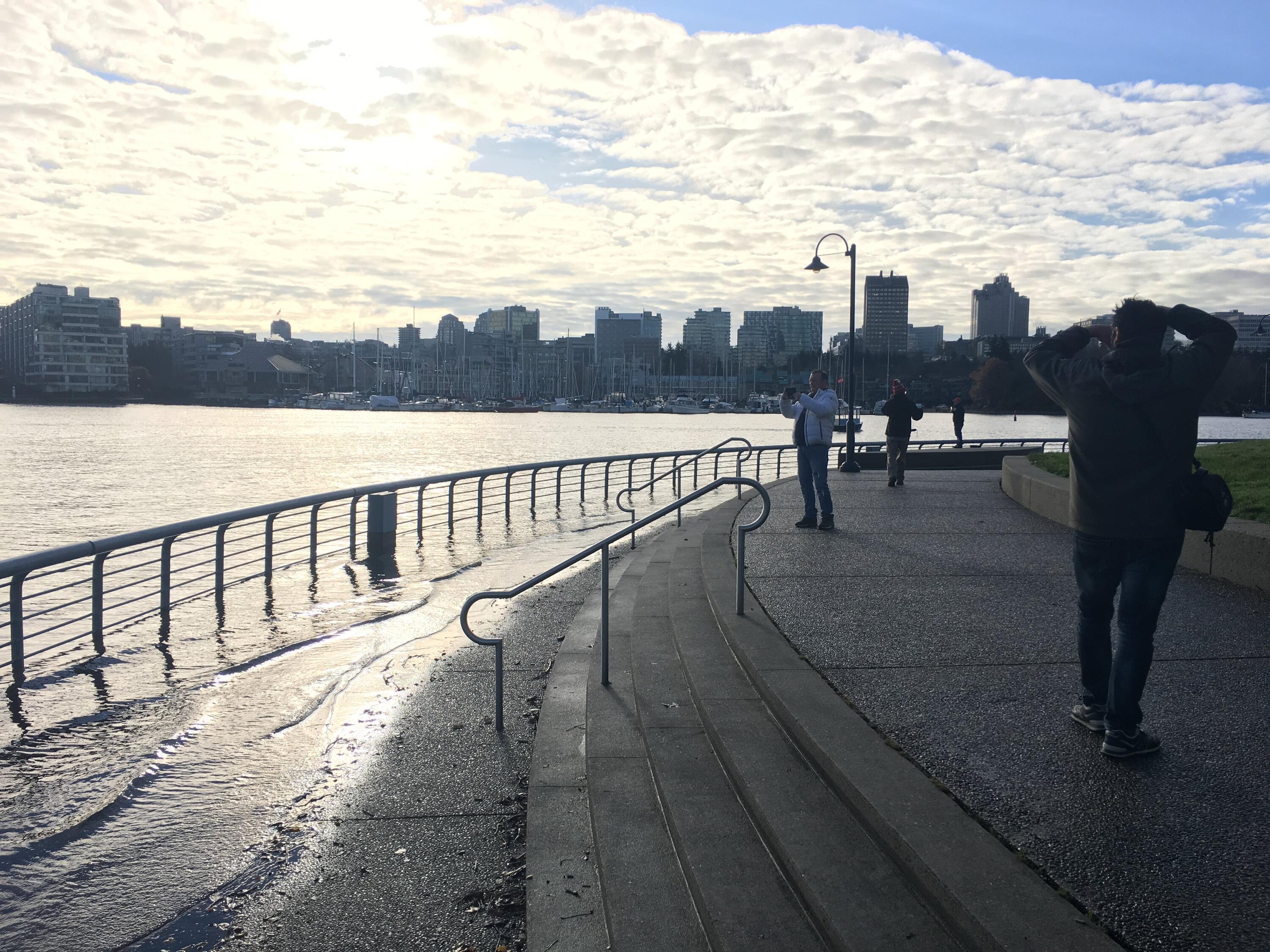
Yaletown, Vancouver BC: The 2017 King Tide in Yaletown saw water lapping over the edge of the walkway and flooding parts of the seawall. (Photo Credit: City of Vancouver)
The Living with Water Theme Partnership is a four year, $1 million project funded by the Pacific Institute for Climate Solution (PICS) that supports research into complex and critically important climate mitigation and adaptation challenges along the South Coast of British Columbia (BC), which includes 20+ Vancouver area municipalities, the Fraser River Delta, Burrard Inlet and Squamish Delta. The goal of the project is to develop new planning and design frameworks and decision-making tools to help communities and ecosystems successfully adapt to the impacts of sea level rise, coastal/riverine flooding and shoreline erosion.
The Living with Water project will focus on addressing three interrelated components currently not addressed in BC’s climate change adaptation planning:
- Better integration of community values and indigenous knowledge and perspectives
- Expansion of decision support tools and alternative flood adaptation solutions (e.g., nature-based solutions, flood defences, managed retreat)
- Stronger multi-level governance arrangements
Led by Associate Professor Kees Lokman at UBC’s School of Architecture and Landscape Architecture, the project aims to connect academic researchers partners from the University of British Columbia, Simon Fraser University, University of Waterloo and Wageningen University with on the ground ‘solution-seekers’ including the City of Surrey, City of Vancouver, West Coast Environmental Law, Squamish (Skwxwú7mesh) Nation, District of Squamish, Tsleil-Waututh Nation, and the BC Provincial Government to co-design solutions for community climate adaptation.
With climate change expected to increase the scale and frequency of flood-related disasters in the Lower Mainland, there is an urgent need for an integrated approach that engages all jurisdictions (federal, provincial, municipal, territorial & First Nations) to ensure the most effective societal, economic and environmental outcomes. Presently there is no single institution that coordinates climate change adaptation or coastal flood management for BC; instead, this responsibility falls on municipalities and First Nations, who recurringly face resourcing and regulatory challenges.
Current climate solutions implemented in BC primarily focus on structural mitigation measures (e.g., dikes, seawalls) that are used to protect high-value development. An alternative strategy to protecting shores from sea level rise would be managed retreat which allows coastlines and communities to recede further inland whilst creating natural coastal habitats. Managed retreat interrupts the ‘flood-rebuild-flood-rebuild’ cycles that we see in many communities, but we need to build a stronger economic case for retreat says Dr. Brent Doberstein, Associate Professor and University of Waterloo academic research partner. The project will advance knowledge on the trade-offs, costs and benefits of retreat as compared to other options such as building protection structures or rebuilding risk after each successive disaster.
I’m particularly excited about the managed retreat component of this project. In the last 8-10 years, managed retreat has received a lot of interest in Canada and other countries. This appears to be linked to a realization that in some situations retreat will be the cheapest option, especially when considering long term climate change and increasing flood risks in some areas.
The PICS research project is a multi-year project that officially launches in March 2021. Many of the Master’s student positions will unfold over the next two years, if you are interested in researching any of these themes mentioned please contact Dr. Hannah Teicher, Researcher-in-Residence Built Environment at PICS.